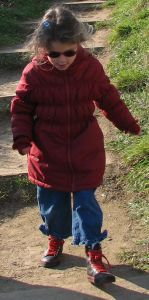 In the effort to survive, children with attachment disorders have learned to think about only themselves. Because the child hasn’t had a chance to develop a healthy long lasting attachment, the child may not have learned how to care about the way his or her behaviors affect anyone else. To a child with an attachment disorder it really doesn’t matter how the new parents or caregivers feel about the child, he or she has not had the opportunity to develop an active conscience.
In the effort to survive, children with attachment disorders have learned to think about only themselves. Because the child hasn’t had a chance to develop a healthy long lasting attachment, the child may not have learned how to care about the way his or her behaviors affect anyone else. To a child with an attachment disorder it really doesn’t matter how the new parents or caregivers feel about the child, he or she has not had the opportunity to develop an active conscience.
A healthy well-attached child begins to care about how their actions affect the other important people in their lives. A child who has been in survival mode for a long period and suffered abuse, neglect or broken attachments has no stake in caring about anyone else.
A healthy child starts to show concern for the way they affect their parents at about the age of two-years-old. At this age, children typically learn to avoid behaviors they know will upset mom or dad. Children at this age start learning to empathize with how other people will feel. This is the core of a child’s conscience development.
A child who has not had the opportunity to develop the core conscience may need to have help learning it is safe to do so now. Parenting a child who has failed to develop the foundation of a conscience will require parents who can wait for trust and be sure their own behaviors are always ethical and consistent.
Helping children learn to label emotions and feelings in themselves is a great stepping-stone for children who need help finding their own conscience. Acknowledging and validating a child’s feelings and offering them a healthy way to express the feelings can teach the child what feelings and emotions are. Once a child understands their own feelings they can begin to understand how other people around them feel.
Talking is an important part of parenting a child who has had a life before becoming our children. Talk about why you choose to behave the way you do frequently with your child. “Mommy likes to make daddy a nice dinner every night to tell him how happy she is that he does a good job as a daddy.”
Remember that some children may be chronologically older then they are emotionally and on some days our child may be operating at the developmental age of two-year-old, when in reality they are eight-years-old. Children are often emotionally and developmentally stuck at certain age stages often at the age when they experienced the greatest trauma. Reinforce the emotional feelings and teach the child to label their own and think about others feelings and emotions often. As children develop empathy they also develop a conscience.
![]() Some of the side effect behaviors seen in children with attachment disorders are:
Some of the side effect behaviors seen in children with attachment disorders are:
- Side Effects of Attachment Disorders Series Introduction.
- Opposition.
- Control.
- Stealing and Jealousy.
- Thinking errors.
- Anger and Rage.
- Feeling.
- Requesting and Meeting the Requests.
- Decision-Making
![]() Special Needs and Adoption-Related Terms:
Special Needs and Adoption-Related Terms:
A | B | C | D | E-F | G-H-I | J-K-L | M | N-O | P | Q-R | S | T-U-V-W-X-Y-Z
For more information about parenting special needs children you might want to visit the Families.com Special Needs Blog and the Mental Health Blog. Or visit my personal website.
Photo credit for this blog entry:  (no use restrictions for this photo)
(no use restrictions for this photo)

